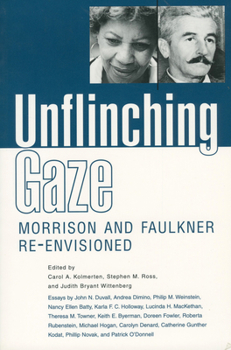Unflinching Gaze: Morrison and Faulkner Re-Envisioned
Select Format
Select Condition 
Book Overview
The fifteen essays in this collection explore the resonant intertextual relationship between the fiction of William Faulkner and that of Toni Morrison. Although the two writers are separated by a generation as well as by differences of race, gender, and regional origin, this close critical examination of the creative dialogue between their oeuvres is both timely and appropriate.
Toni Morrison's brilliant and powerful novels of the past two decades have accorded her a position in the front ranks of American writers, and like Faulkner before her, she has been awarded the Nobel Prize for literature. She has publicly acknowledged her artistic indebtedness to Faulkner on a number of occasions. But Morrison also resists the Faulknerian heritage in profound ways. This resistance is certainly, in part at least, the natural reluctance of any highly original artist to be regarded as the product of her predecessor's influence. This push-pull of Morrison's acceptance of and resistance to the Fa
Format:Paperback
Language:English
ISBN:0878059563
ISBN13:9780878059560
Release Date:March 1997
Publisher:University Press of Mississippi
Length:264 Pages
Weight:0.05 lbs.
Dimensions:0.7" x 6.0" x 9.2"
Customer Reviews
0 rating





